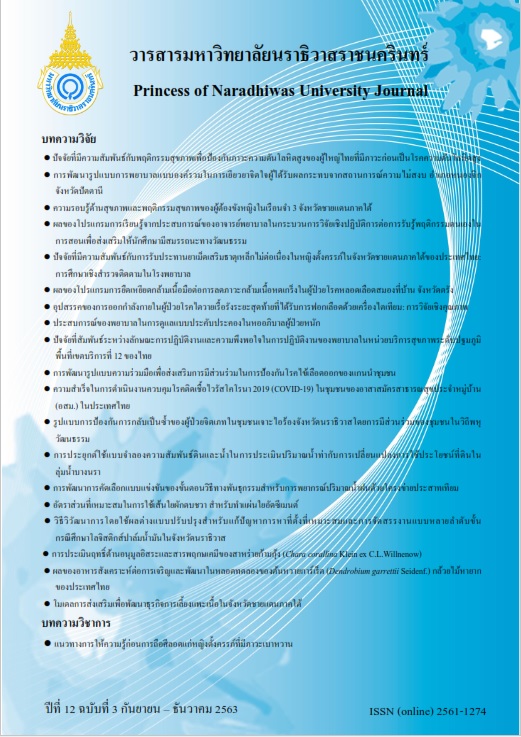Schizophrenia Relapse Prevention Model Patients in Cho-I-Rong, Narathiwat Province with Multicultural Community Participation
Keywords:
Relapse prevention, Schizophrenia patients, Multiculture, Qualitative researchAbstract
The objective was to study the model to prevent a relapse in Schizophrenic of patients in Cho-I-Rong, Narathiwat province with multicultural community participation. The samples of the study were 12 Schizophrenia patients’ relatives or cousins whom did not have the relapse record and some officials from network partners who took care of Schizophrenic patients in the community. This study was a qualitative research using focus group discussion method with 12 semi-structured questions. The 12 questions received Item-Objective Congruence (IOC) at 0.61.
The results of the research revealed that Schizophrenia relapse prevention process were found as follows: 1) providing knowledge 1.1 promote patient home visits; the officers having good relationship and interaction with patients 1.2 provide psychoeducation and the use of religious therapy 1.3 relatives or cousins taking action in observing and taking care of patients by using religious practices as a guideline in caring process, 2) raising awareness for continuing treatment 2.1 promote the way of picking up medicine near home 2.2 use religious principles to help in transforming beliefs, attitudes, and in raising awareness, 3) reducing and stopping using addictive substances 3.1 transfer patients to receive treatment at the hospital, provide therapy camp based on religious guidelines or having religious leaders training in the village 3.2 focus on individual case study and religious practices 3.3 provide information of patients’ relatives to village leader team, village health volunteers, officials from health department and soldiers in the area, 4) emotional management 4.1 provide training to patients and their relatives on emotional management 4.2 relatives observing patients’ symptoms and trying to reduce stimulation 4.3 use religious practices to calm down 4.4 psychiatric patients and their relatives meeting with psychologists to do mental status examination, 5) the community participation 5.1 the relatives bring patients to participate in religious activities in the community 5.2 religious leaders participate in the care process 5.5 encourage network partners to participate in the care process without discrimination and 6) do not create a stigma for each other 6.1 build up good consciousness for people in the community, based on religious principles 6.2 strengthen ‘life still has hope’ activities.
References
Boontod, K., Srikhamsukh, A and Arunphongphisal, S. (2011). Social Support in Patients with Schizophrenia. Journal of Psychiatr Assoc Thailand, 58 (1): 89-100
Choorat, N. (2016). The Study of Causes and Ways to Prevent a Recurrence of Schizophrenic Patients in The Community of Pi-leng District Health Care Promoting Hospitals which Experiencing Unrest Situation in the Southern Provinces of Thailand. Princes of Naradthiwas University of Humanities and Social Science. (in Thai)
Dumrak, P., Wangthong, A and Wangthon, A (2016). Community Participation in caring of complex chronic Schizophrenia patients in Nongjit, Pattani province. Journal of the Association of Researcher, 9(2): 92-103
Fangkaew, P. (2015). The effect of anger management emphasizing cognitive therapy on a aggressive behavior of schizophrenia patients (Master’s thesis). Bangkok: Chulalongkorn Univerisity. (In Thai).
Gunson, N. (2018). Islamic based therapy for substance addicts (Master’s thesis). Bangkok: Chulalongkorn Univerisity. (In Thai)
Manag, J. (1996). The advanced practice nurse as case manager. Journal of Case Management, 5(3): 121:6.
McFarlane, W (2016). Family Interventions for Schizophrenia and the Psychoses: A Review Family Process, 55 (3): 460:82.
Misri, K and Daengdomyut, P. (2012). Selected Factors Related to Capabilities Among Caregivers of Schizophrenic Patients in Community. Journal of Psychiatric Nursing and Mental Health, 26(1): 35-49
Phanyasuwathakharo, N. (2017). Coexistence of People in the Multicultural Society: A case study of Multicultural Society in Bangkok Community, Bangkok, Buddhist Research in Maha Chulalongkorn University. (In Thai).
Phrakhru Priyatiwrophirm, Phra Rachakairung, P., & Phrakhruplalad Drangsun, K. (2018). A Study of Anger Management with Metta Principle in Theravada Buddhism Philosophy. Nakhon Pratum: Mahamakul Buddhist University. (In Thai).
Phutrod, P. (2018). The development of a continuous care model in schizophrenia patients. Journal of Health Science, 27(3): 478-485
Piboonarluk, W., Yunibhand, J., Pouwkantarakorn, W and Unharasamee, W. (2018). The effect of case management by advanced practice nurse on relapse in person with schizophrenia. Thai Journal of Nursing and Mid Wifely Practice, 5(2): 5-18
Sanders C. (2003). Application of Colaizzi’s method: interpretation of an auditable decision trail by a novice researcher. Contemp Nurse, 14 (3): 292-302.
Tiyawisutsri, C., Pakdeewong, P and Wanpornsiry, C. (2016). Multicultural nursing: The competencies required for nurses in Thailand. Journal of Health Science Research, 1(1): 8-15
Thongsai, S. (2015). Schizophrenia care in a sustainable Thai society context. Journal of Nursing Division, 42(3).
Sathiyuthakarn, S. (2016). Relapse in chronic Schizophrenia patients: Situation and prevention guidelines. Journal of Nursing Science Chulalongkorn University, 28(3): 1-15
Wirakeirt, S., Narakorn, B and Chaichumni, N. (2015). The development of a supportive nursing program based on Buddhism principles for using narcotic Schizophrenic patients. Songklanagarind Journal of Nursing, 35(1): 85-93




